
What was wrong with Aurora
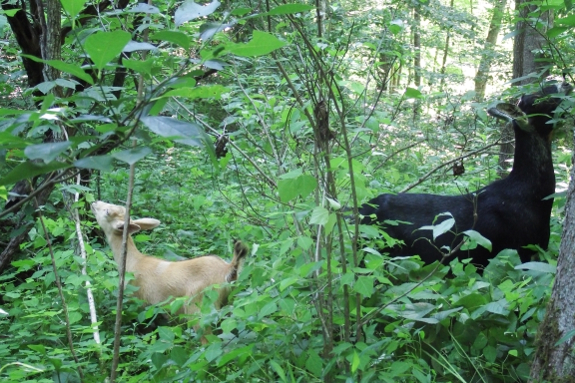
Oh the drama of farm
life! Mark
downplayed Aurora's illness when he posted about her earlier this week.
Personally? I was convinced she'd be dead every time I trotted up to
the goat barn to check on our baby goat.
Whatever it was came on
overnight. When we put her in the kennel at evening milking, our
doeling was spunky and happy. When I came to get her out twelve hours
later, she was standing against the back wall, listless. Her head was
cocked at an awkward angle and her whole body looked sore. She wasn't
interested in eating and wouldn't even nurse from her mother. Bad news.
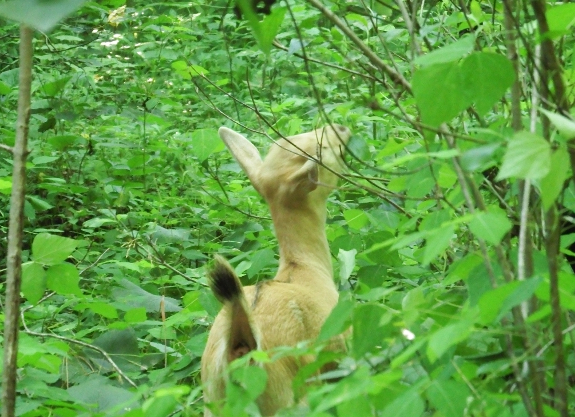
The vet guessed it might
be a heavy parasite load, mostly based on Aurora's age and the fact
she's a goat. To be on the safe side, he shot her up with selenium +
vitamin E, vitamin B-12, a painkiller/anti-inflammatory, and a
dewormer. Then he sent her home and told us to feed her half a cup of
yogurt per day until she started eating on her own.
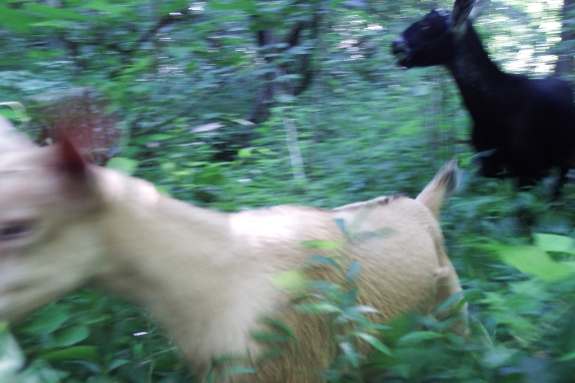
That turned out to be
quite a challenge. In fact, that first day I was so terrified that I
couldn't figure out how to get her to eat anything. But after a good
night's sleep I remembered the big, needle-less syringes I'd bought as
part of our kidding kit. Yogurt mixed with some goat milk and a bit of Nutri-drench was just thin enough to
squirt down her throat if Mark restrained her and I pried open her
jaws. By the dinner feeding, Aurora was starting to look a little less
pained and a little more normal.
But 48 hours after her
symptoms appeared, she was still in very bad shape. Proving that our
goats are pets rather than livestock, we
rushed Aurora back to the clinic at the vet's earliest possible
convenience. This time, our doeling got an anti-coccidiosis shot, two
types of injectable antibiotics, a different dewormer, more vitamin
B-12, and a corticosteroid. The vet also sent us home with followup
shots for the antibiotics and a big jug of amino
acids/electrolytes/vitamins.
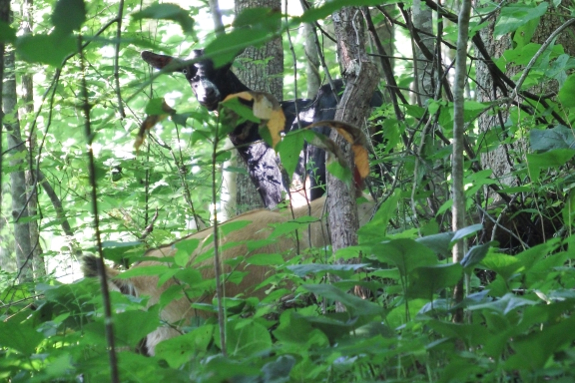
If you've seen me in
real life avoiding doctors at all costs (except for my sweet
sister...who I see in a nonprofessional capacity), you'll know I'm
leery of unnecessary pharmaceuticals. But I was terrified of losing our
dear doeling and was thrilled to have the vet inject Aurora with
everything under the sun.
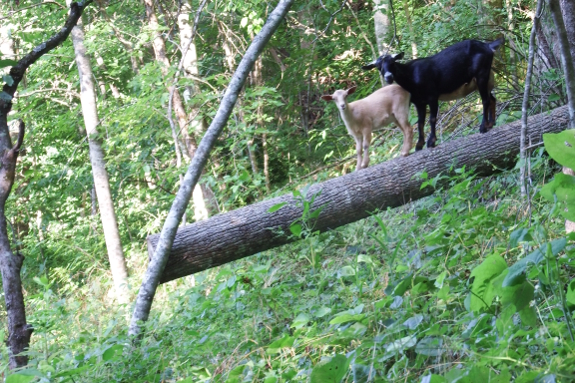
To my delight, something
worked. We hadn't been able to get Aurora to eat on her own or nurse
for two full days, but on the way home she was already nibbling on
Mark's sleeve. Six hours later, she was ready to go out and graze with
her mother and bounce about on logs. The next day, we stopped squirting
yogurt down her throat because Artemesia's udders proved that the
doeling had drunk a pint of milk overnight.
I'd feel better if I
knew for sure what had been wrong with Aurora. I think it's quite
possible she was weakened by her brother's weaning --- Punkin is much
more adamant than his sister, and I think she actually got more milk with him present
because he was better able to pin their mother down better. (Artemesia
is starting to think her kids are big enough to eat greenery and not
visit the milk bar all the
darn time.)
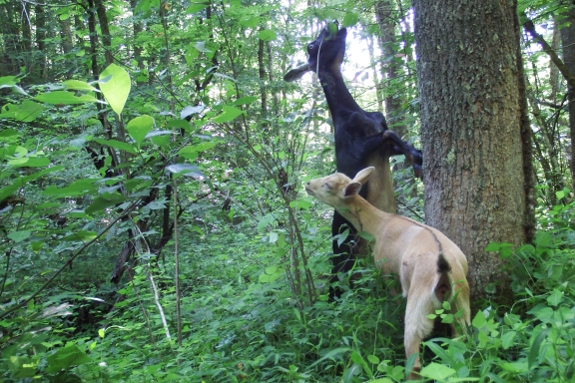
Or the vet may be right
and it's my own fault for not forcing Aurora to eat her copper
bolus when the rest of the herd was treated last week. I hadn't
thought she was at as much risk of worms due to subsisting so much
milk. But it's easy to see how intestinal parasites can explode when
gut bacteria are just starting to figure out the transition from milk
to grass and when kids haven't yet learned not to eat off the ground.
Aurora will definitely get her copper next week once her system is back
up to snuff.
I'd be curious to hear
from other goatkeepers. Based on the data above (and especially the
speedy bounce-back time), any ideas what was wrong with our little
goat? And, for everyone else (especially Kayla and Jed), thank you so
much for sending your healing wishes in Aurora's direction. It's
wonderful to have you on our team.
Want more in-depth information? Browse through our books.
Or explore more posts by date or by subject.
About us: Anna Hess and Mark Hamilton spent over a decade living self-sufficiently in the mountains of Virginia before moving north to start over from scratch in the foothills of Ohio. They've experimented with permaculture, no-till gardening, trailersteading, home-based microbusinesses and much more, writing about their adventures in both blogs and books.
Want to be notified when new comments are posted on this page? Click on the RSS button after you add a comment to subscribe to the comment feed, or simply check the box beside "email replies to me" while writing your comment.

What a relief to hear she's feeling better! It is very common for weaning kids to come down with coccidiosis. You didn't mention if she had diarrhea or not, which is usually the primary symptom, as well as feeling puny. I understand the desire to do whatever you can to make her better.
I tell ya, just about everything in goats comes down to their gut. Healthy rumen seems to equal healthy goat.
Karla --- I definitely agree on the monitoring front and the grain-free front! I didn't think Aurora was old enough to have to do fecal counts on...but apparently I was wrong....
Another Julie --- I'll bet you're right. Aurora hasn't had any diarrhea, but her pellets have always been slightly stickier than anyone else's --- she'll often have one stuck to the fur of her back legs. So she may have been dealing with coccidiosis all along, then the semi-weaning stress made it flare up.
Hi Anna. I've been researching dandelions for health and found interesting info regarding it's cousin, chicory: Wikipedia:
Root chicory contains volatile oils similar to those found in plants in the related genus Tanacetum which includes Tansy, and is similarly effective at eliminating intestinal worms. All parts of the plant contain these volatile oils, with the majority of the toxic components concentrated in the plant's root.[30]
Chicory is well known for its toxicity to internal parasites. Studies indicate that ingestion of chicory by farm animals results in reduction of worm burdens,[31][32][33] which has prompted its widespread use as a forage supplement. Only a few major companies are active in research, development, and production of chicory varieties and selections, most in New Zealand.
Do you have chicory on the farm?
Usually that is accompanied by runny poo, but maybe it did not get that far because you are such an observant goat-keeper. Coccidia overwhelm almost overnight.. unlike other worms, in my experience, which take a longer time for you to see the effects.